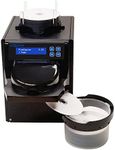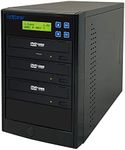Buying Guide for the Best DVD Duplicators
When choosing a DVD duplicator, it's important to consider your specific needs and the features that will best meet those needs. DVD duplicators are used to create multiple copies of DVDs quickly and efficiently, making them ideal for businesses, educational institutions, and individuals who need to distribute large quantities of DVDs. Understanding the key specifications will help you make an informed decision and ensure you get the best product for your requirements.Number of DrivesThe number of drives in a DVD duplicator determines how many copies you can make simultaneously. This is important because it directly affects the speed and efficiency of your duplication process. If you need to produce a large number of copies quickly, a duplicator with more drives (e.g., 7 or 10) will be beneficial. For smaller tasks, a duplicator with fewer drives (e.g., 1 to 3) may be sufficient. Consider the volume of duplication you expect to handle regularly to choose the right number of drives.
Duplication SpeedDuplication speed refers to how quickly the duplicator can copy data onto DVDs. This is measured in terms of 'X' speed, where higher numbers indicate faster duplication. For example, a 24X duplicator will copy data faster than a 16X duplicator. If time is a critical factor for you, opt for a higher speed duplicator. However, for occasional use or smaller batches, a standard speed may be adequate. Assess how quickly you need your copies and choose a speed that matches your requirements.
Supported FormatsSupported formats indicate the types of DVDs that the duplicator can handle, such as DVD-R, DVD+R, DVD-RW, and DVD+RW. This is important because compatibility with different formats ensures versatility and flexibility in your duplication tasks. If you work with various DVD formats, choose a duplicator that supports multiple formats. If you primarily use one type of DVD, ensure the duplicator is compatible with that specific format. Knowing the formats you need to duplicate will guide you in selecting the right duplicator.
Standalone vs. PC-ConnectedStandalone duplicators operate independently without the need for a computer, while PC-connected duplicators require a computer to function. Standalone duplicators are convenient and easy to use, making them ideal for users who prefer a simple, plug-and-play solution. PC-connected duplicators offer more control and additional features through software, which can be beneficial for advanced users who need more customization. Consider your technical proficiency and the level of control you need when deciding between standalone and PC-connected duplicators.
Error Detection and CorrectionError detection and correction features help ensure the quality and accuracy of the duplicated DVDs. This is important because it minimizes the risk of producing faulty or unreadable copies. Some duplicators come with advanced error detection and correction capabilities, which can be particularly useful for professional or high-volume duplication tasks. If you need high reliability and quality assurance, look for duplicators with robust error detection and correction features. For less critical tasks, basic error handling may suffice.
Ease of UseEase of use refers to how user-friendly the duplicator is, including its interface, setup process, and overall operation. This is important because a more intuitive and straightforward duplicator will save you time and reduce the likelihood of errors. Features like an LCD screen, simple button controls, and clear instructions can enhance ease of use. If you are not very tech-savvy or need to train multiple users, prioritize a duplicator that is known for its ease of use. For more experienced users, advanced features may be more important than simplicity.



















